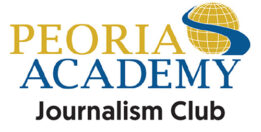 Banning books is a controversial subject for many Americans. The Peoria Academy journalists feel strongly that prohibiting books is unnecessary and extreme. There are better (and less extreme) alternatives to supervising access to books. We take pride that our state was the first in the county to ban book banning. House bill 2789 took effect in January of last year, making it illegal to ban most literary resources in the state of Illinois. This has allowed thousands of students to read diverse books and become well-rounded students.
Banning books is a controversial subject for many Americans. The Peoria Academy journalists feel strongly that prohibiting books is unnecessary and extreme. There are better (and less extreme) alternatives to supervising access to books. We take pride that our state was the first in the county to ban book banning. House bill 2789 took effect in January of last year, making it illegal to ban most literary resources in the state of Illinois. This has allowed thousands of students to read diverse books and become well-rounded students.
There have been 10,046 books banned throughout the United States in the 2023-24 school year according to PEN America (a website dedicated to studying banned books). States such as Florida, Tennessee, and Texas have banned popular books including “Hunger Games” and “To Kill a Mockingbird” for inappropriate language and violence. Florida has banned the Dictionary due to concerns about inappropriate words. This decision stems from the belief that even a few controversial words should not be part of the educational material. Schools in Tennessee have banned Harry Potter books due to use of witchcraft. Additionally, many books are banned because of sexuality, such as: “Gender Queer,” “All Boys Aren’t Blue,” and “Beyond Magenta.”
We can see extensive examples throughout history of book bans, going all the way back to the Library of Alexandria, the first library. There have been attempts in the modern day United States to stop this practice, but very few states have achieved such measures. We at Peoria Academy Journalism see book banning as wrong and undemocratic.
Banning books restricts young readers from absorbing content that may be “Adult.” These topics are important for the youth to understand. According to PEN America “Nearly 60% of these banned titles are written for young, adult audiences, and depict topics young people confront in the real world, including grief and death experiences, with substance abuse, suicide, depression, mental health concerns, and sexual violence.” These subjects are real world problems and may even inspire or help the reader to find help. We may “just be students” but we are often underestimated and books with difficult topics such as racism help us understand the world around us, how the world came to be, and how we can change it moving forward.
Before making decisions, facts must be examined. Banning books can have a negative impact on readers of all ages, from children to adults. According to informationmatters.org, banning books can stifle children’s mental and emotional growth. Not only does banning books impact readers, but it impacts authors as well. It affects their ability to publish, as well as their profits, according to authorsguild.org. On top of that, statisticians at PEN America say that around 25% of all existing books were banned as of the 2023-24 school year. Reading can help expand the imagination of all ages. Additionally, it can also assist in giving breaks to people who are often on screens or electronic devices.
As students and active readers, the Peoria Academy Journalism Club is not in favor of book banning. We believe this practice stops children from experiencing the world around them, but we do understand that parents should know what their children are reading. Instead of banning books we propose that parents should be signing off on mature content or books that are found on banned lists. Allowing young children to read freely without the concern of mature content is impossible. With stricter guidelines parents can approve of their children reading mature books, allowing every student freedom to read what they would like. We shouldn’t shelter children from experiencing the world around them.
— By Amelie Egan, Ammini Guzzardo, Lea Lagache, Iyla Robinson, and Emelia Stevenson
